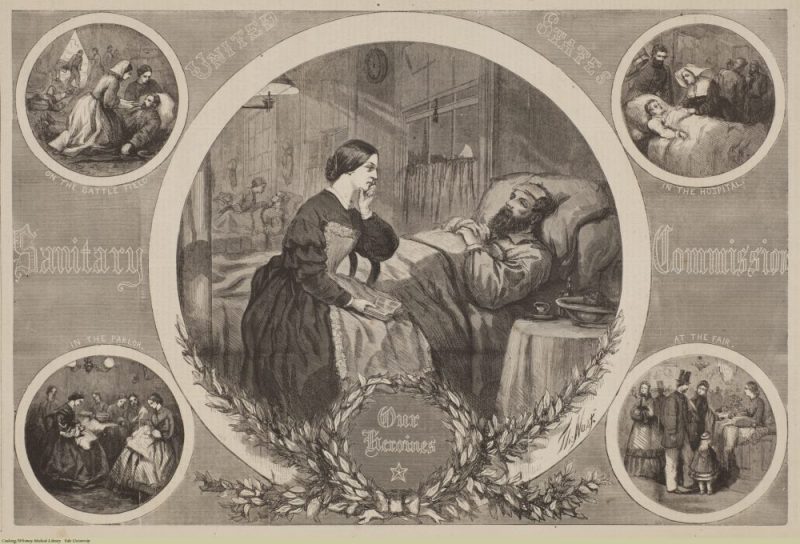“He is the last of seven sons” – One Sanitary Agent Witnesses the Tragedy of War in St. Louis

In her first assignment as an agent with the Chicago branch of the U.S. Sanitary Commission, Jane Hoge witnessed the true tragedy, devastation, and sacrifices that the Civil War brought upon Americans. At age 50 and the mother of two Federal soldiers, she wanted to serve her boys in blue. Soon after volunteering, Hoge was asked to visit the military hospitals at Cairo, Mound City, and St. Louis. Her goal was “to examine those hospitals which were under the immediate supervision of the Branch, and report their condition.”
At the military hospital at Jefferson Barracks near St. Louis, as she took her “slow and solemn walk through this congregation of suffering humanity,” Hoge saw a woman grieving over a dying soldier:
“In passing through the wards, I noticed a woman seated beside the cot of a youth, apparently dying. He was insensible to all around; she seemed no less so. Her face was bronzed and deeply lined with care and suffering. Her eyes were bent on the ground, her arms folded, her features rigid as marble. I stood beside her, but she did not notice me. I laid my hand upon her shoulder, but she heeded me not. I said, ‘Is this young man a relative of yours?’ No answer came. ‘Can’t I help you?’ With a sudden start that electrified me, her dry eyes almost starting from the sockets and her voice husky with agony, she said, pointing her attenuated finger at the senseless boy, ‘He is the last of seven sons – six have died in the army, and the doctor says he must die to-night.’ The flash of life passed from her face as suddenly as it came, her arms folded over her breast, she sank in her chair, and became as before, the rigid impersonation of agony.”

While short in length, this small passage from Jane Hoge’s account in Woman’s Work in the Civil War gives us a glimpse into the tragedy of this conflict. Costing approximately 2-3% of the American population, the Civil War’s death toll affected virtually every community, most of whom died a death that shattered American’s views of a ‘heroic’ or ‘good’ death. Stories, like the one above, give us historians a view into how these kinds of deaths were processed and perceived by 19th century Americans.
Source:
L.P. Brockett, Woman’s Work in the Civil War: A Record of Heroism, Patriotism, and Patience (Boston, MA: Zeigler, McCurdy, & Co., 1867), 562-576.
So much blood–America lost many of her best & brightest. I think that sacrificing one’s life for country is still a “good” death. Maybe not in the traditional sense, but fine and honorable. There are worse things than war.
i WAS MOVED BY THE STORY AND NOT TO TAKE AWAY FROM IT . BY ANY MEANS . WOULD YOU MIGHT CONSIDER IT A POLITICAL MYTH IN STEAD .? I HEARD OF Lincoln AND THE WIDOW FROM MAINE I THINK WITH 3 SONS ? AGAIN NOT MEANT IN A NEGATIVE WAY PLEASE .